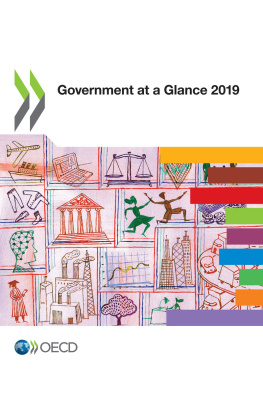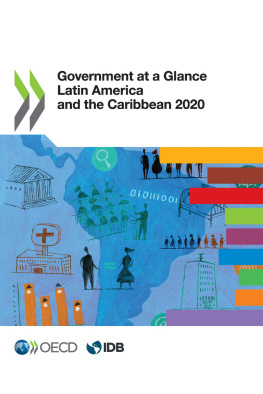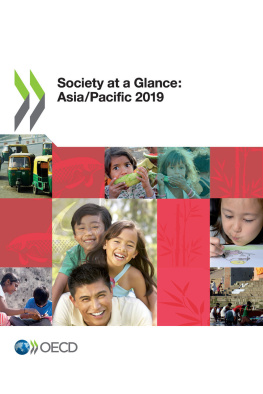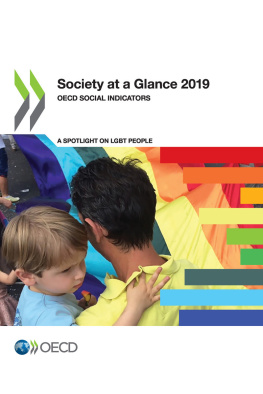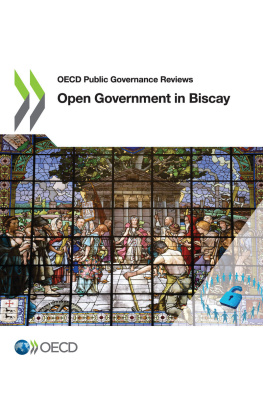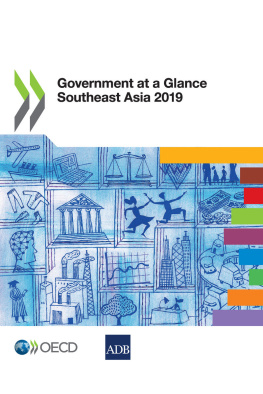OECD - Government at a Glance 2019
Here you can read online OECD - Government at a Glance 2019 full text of the book (entire story) in english for free. Download pdf and epub, get meaning, cover and reviews about this ebook. year: 2019, publisher: OECD Publishing, genre: Politics. Description of the work, (preface) as well as reviews are available. Best literature library LitArk.com created for fans of good reading and offers a wide selection of genres:
Romance novel
Science fiction
Adventure
Detective
Science
History
Home and family
Prose
Art
Politics
Computer
Non-fiction
Religion
Business
Children
Humor
Choose a favorite category and find really read worthwhile books. Enjoy immersion in the world of imagination, feel the emotions of the characters or learn something new for yourself, make an fascinating discovery.
Government at a Glance 2019: summary, description and annotation
We offer to read an annotation, description, summary or preface (depends on what the author of the book "Government at a Glance 2019" wrote himself). If you haven't found the necessary information about the book — write in the comments, we will try to find it.
OECD: author's other books
Who wrote Government at a Glance 2019? Find out the surname, the name of the author of the book and a list of all author's works by series.
Government at a Glance 2019 — read online for free the complete book (whole text) full work
Below is the text of the book, divided by pages. System saving the place of the last page read, allows you to conveniently read the book "Government at a Glance 2019" online for free, without having to search again every time where you left off. Put a bookmark, and you can go to the page where you finished reading at any time.
Font size:
Interval:
Bookmark:
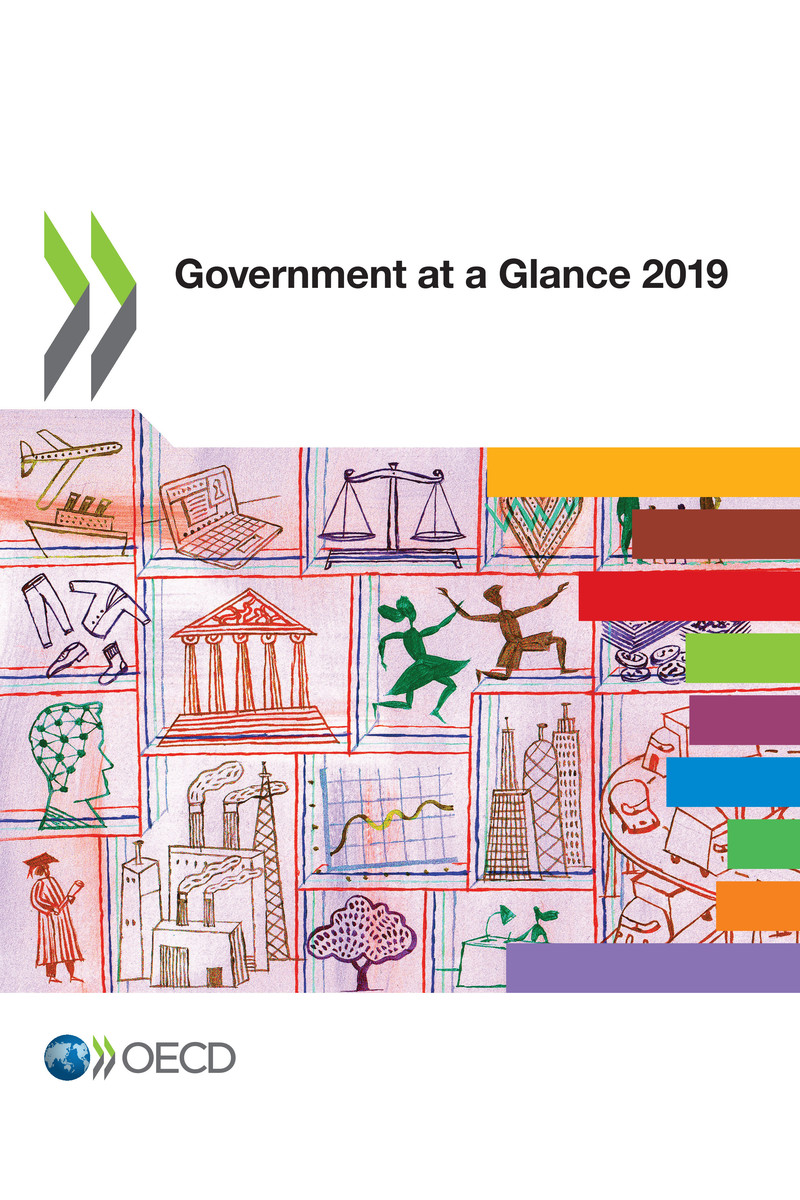
OECD (2019), Government at a Glance 2019 , OECD Publishing, Paris, https://doi.org/10.1787/8ccf5c38-en .
The information in this document with reference to Cyprus relates to the southern part of the Island. There is no single authority representing both Turkish and Greek Cypriot people on the Island. Turkey recognises the Turkish Republic of Northern Cyprus (TRNC). Until a lasting and equitable solution is found within the context of the United Nations, Turkey shall preserve its position concerning the Cyprus issue.
The Republic of Cyprus is recognised by all members of the United Nations with the exception of Turkey. The information in this document relates to the area under the effective control of the Government of the Republic of Cyprus.
More than a decade after the financial crisis, OECD countries are still experiencing relatively slow economic growth. They are also saddled with a large debt burden, and facing challenges related to ageing populations and rapid technological change. At the same time, peoples trust in public institutions and the their perception of the responsiveness, integrity and efficiency of the public sector have yet to fully recover from the crisis, limiting the capacity of governments to implement necessary reforms. In this context, taking a people-centric approach to policy making and service delivery becomes urgent. Such an approach entails governments better taking the needs and expectations expressed by the people into account when designing, implementing and evaluating public policies and services.
Government at a Glance 2019 , the sixth edition of the flagship publication of the OECD Public Governance Committee, focuses on progress made by OECD countries in achieving people-centricity in their public management and governance practices and in service delivery. Data show that countries are improving service provision, which is reflected in the levels of public satisfaction with key public services, making headway in the use of people-centric public governance practices.
The major objective of the Government at a Glance series is to provide reliable, internationally comparative data on government activities in OECD countries, accession countries, and other major economies. These data can be used to benchmark governments performance, track national and international developments over time, and provide evidence for policy making.
As in every edition, there are indicators on the entire government production process from inputs through processes to outcomes. A unique feature of the publication is that data on public management and governance practices are collected by OECD survey instruments from government officials, validated by OECD experts. This edition contains chapters on the roles and responsibilities of selected institutions, budgeting practices and procedures, human resources management, regulatory governance, public procurement and open and digital government. Input data focus on public finance and employment, while outcome data include indicators on core government results such as trust in government, political efficacy, role of the government in reducing income inequalities as well as indicators on access, responsiveness, service quality and citizen satisfaction in education, health and justice services.
The indicators in Government at a Glance are unique, and have been developed to monitor countries progress with OECD principles and recommendations on various public governance practices. As a result, they are a recognised benchmark in many fields of public governance, allowing for more informed, evidence-based policy discussions worldwide.
Government at a Glance 2019 was prepared by the OECD Directorate for Public Governance, under the leadership of Marcos Bonturi, Director. The work was led by Zsuzsanna Lonti, under the direction of Irne Hors and Monica Brezzi. The publication was drafted by Barbara Baredes, Santiago Gonzalez, Alessandro Lupi, and Minjoo Son. Clara Delcourt provided research assistance. Major contributions were received from Daniel Gerson, Donal Mulligan and Pinar Guven (. We also thank Andrea Uhrhammer for editorial support, as well as Julie Harris and Joelle Palmieri for their help in preparing the document for publication. Translation in French was made possible thanks to Maia Kirilovski, Frederic Berri and Maria Eiguren.
The publication is the result of contributions from a wide range of sources and expertise. It benefited from inputs by the OECD Public Governance Committee; the Government at a Glance Steering Group (details in ); the Committee on Statistics and Statistical Policy (CSSP) ; the Public Employment and Management Working Party; the Working Party of Senior Budget Officials; the Working Party of Senior Digital Government Officials (E-Leaders); the Working Party of Leading Practitioners on Public Procurement; and the OECD Expert Group on Open Data. Valuable comments were received from Gaetan Lafortune, Chris James and Maxime Ladaique of the OECD Directorate for Employment, Labour and Social Affairs; Corinne Heckman, Daniel Sanchez Serra and Camila Demoraes of the OECD Directorate of Education and Skills; Carlotta Balestra of the OECD Statistics and Data Directorate; and Oliver Petzold from the OECD Centre for Tax Policy and Administration.
Today, the worst consequences of the 2008 financial crisis may be behind us. Yet, most OECD countries are still saddled with high debt loads that, on average, amounted to 110% of GDP in 2017. Such high debt levels reduce governments ability to stimulate economic growth and address imperative challenges, including rising inequalities and a sense of insecurity induced by rapid technological advancements that are making many people feel insecure about the future of their work. Redistribution through taxes and transfers has fallen. There is also less money available for investment, while the urgency to renew ailing infrastructure is becoming increasingly apparent.
Font size:
Interval:
Bookmark:
Similar books «Government at a Glance 2019»
Look at similar books to Government at a Glance 2019. We have selected literature similar in name and meaning in the hope of providing readers with more options to find new, interesting, not yet read works.
Discussion, reviews of the book Government at a Glance 2019 and just readers' own opinions. Leave your comments, write what you think about the work, its meaning or the main characters. Specify what exactly you liked and what you didn't like, and why you think so.

